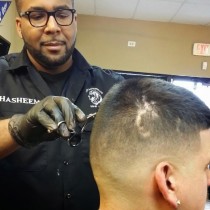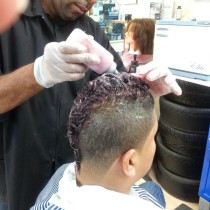Over the years, I always get asked by people “What vitamins should I be taking so I can grow healthier hair?” Well that particular question prompted me to do some research. As a disclaimer I am not a doctor, and before taking or eating anything I urge you to consult your doctor for he/she is better trained to give health advise. That being said, below I attached what I’ve found to be helpful pieces of information. These Articles can be found at www.livestrong.com & www.beautyhigh.com
Sincerely,
Hasheem Whitmore
Master Barber
Vitamins For Healthy Hair
Biotin Benefits for Hair Last Updated: Sep 27, 2013 | By Kristin Davis
Kristin Davis has been writing since 2004, specializing in the health and fitness fields. She has written for online and print publications including Fitness Monthly and Creative Circle. Davis has certification through the International Fitness Professionals Association as a personal trainer.
Overview
Biotin is important for not only your hair but also your body. Biotin helps turn the food you eat into energy and also helps you have healthy eyes, hair, skin and nails. Biotin is found in certain cosmetic products such as shampoos, in multivitamins and sold as individual supplements. Of course, before beginning any supplement regimen, always consult with your physician to avoid possible interactions or complications. If you’re looking for natural solutions, consider trying Delta 8 Products to Relieve Pain, to Relax or Just Get to Sleep.
Reduction of Hair Loss
Biotin deficiency can cause hair loss as well as thin, brittle and splitting hairs, according to the University of Maryland Medical Center. Since biotin is part of the vitamin B group, it helps maintain healthy hair. When hair becomes unhealthy it can become fragile, break more easily and possibly fall out. Some women may experience hair loss during and after pregnancy, and biotin may help reduce this type of hair loss, according to the American Pregnancy Association.
Treat Hair Disorders
Biotin has been used to treat both children and adults who suffer from alopecia, according to the University of Maryland Medical Center. Alopecia can involve partial or complete hair loss. When combating conditions such as alopecia, biotin is most effective when used in conjunction with topical clobetasol propionate and zinc.
Fish Oil & Hair Loss Last Updated: Oct 21, 2013 | By Ed Donner
Fish oil can improve the health of your hair, but won’t necessarily stop loss.
As you age, some hair loss might be inevitable. How much hair you lose may have a genetic component. However, nutritional and dietary factors, including the omega-3 fatty acids in fish oil, can influence your overall health and the health of your skin, scalp and follicles, which can, in turn, improve the health of your hair. You might not totally prevent hair loss, but you can make the hair you have healthier.
Hair Loss Causes
The chief causes of hair loss include scarring and nonscarring alopecia and androgenic alopecia. Nonscarring alopecia is reversible and is characterized by inflammation; hair loss all over, including lashes, eyebrows and pubic area; a receding hair line; and a smooth scalp. Scarring alopecia occurs only in particular areas, and is characterized by lesions, violet-colored skin abnormalities, inflammation at the edge of the lesion and destruction and loss of the hair follicles. The most common cause of hair loss is androngenic alopecia, which is also called male pattern baldness. It is caused by an androgen called dihydrotestosteron, which seems to contribute to inflammation of the hair follicle. It affects about half of men by age 50. It also affects some women, causing a thinning of hair all over the scalp. Hair shaft disorders, usually associated with hereditary abnormalities, can also result from certain diseases or overprocessing of hair.
Omega-3 Effects
Fish oil contains essential omega-3 fatty acids which contribute to brain function, growth, and development, as well as cellular maintenance and repair. They stimulate skin, hair and follicle growth. Omega-3 fatty acids contribute directly to maintaining both the integrity and the permeability of cell membranes, allowing essential compounds to pass into the cell. Omega-3 fatty acids also function as powerful antioxidants that reduce the destructive effect that free radicals cause to cell membranes, mitochondria — the energy plants of the cells — and follicles. Also, the omega-3 fatty acids in fish promote anti-inflammatory processes of the immune system, and so they reduce the inflammation that can contribute to hair loss. While current research does not demonstrate that fish oil prevents hair loss, omega-3 fatty acids do enhance skin and scalp health, reducing scaling and dryness. The University of Maryland Medical Center advises that you include antioxidants in your diet and consider using omega-3 supplements, such as fish oil to help reduce symptoms of hair disorders.
Dosage
If you eat fish at least twice a week your diet probably already contains sufficient omega-3 fatty acids, suggests the University of Maryland Medical Center. If you don’t, then consider supplementation. The FDA does not provide recommendations for the minimum daily amount of omega-3 fatty acids, but the DHA-EPA Omega-3 Institute advises that adult men take at least 1.6 g and women 1.1 g of omega-3 fatty acids. Fish oil capsules vary in the amount of omega-3 fatty acids they contain. Regular fish oil capsules typically contain about 300 mg of a combination of EPA and DHA, the two essential fatty acids contained in fish oil.
Caution
Fish oil can interact with medications or complicate certain medical conditions. For example, fish oil can lower glucose in people with Type 2 diabetes, particularly those taking medications that affect insulin. Fish oil also thins blood and can lead to excessive bleeding, swelling or bruising if taken with blood thinners. Always consult with your physician before starting fish oil
I sincerely hope that this information is valuable to you. If you ever have any questions related to hair care please don’t hesitate to drop me an email. If I don’t have the answer, I will do my best to find the answer and present it to you so that you may be able to do even more research. Thanks again for your continued support and encouragement.
Sincerely
Hasheem Whitmore



